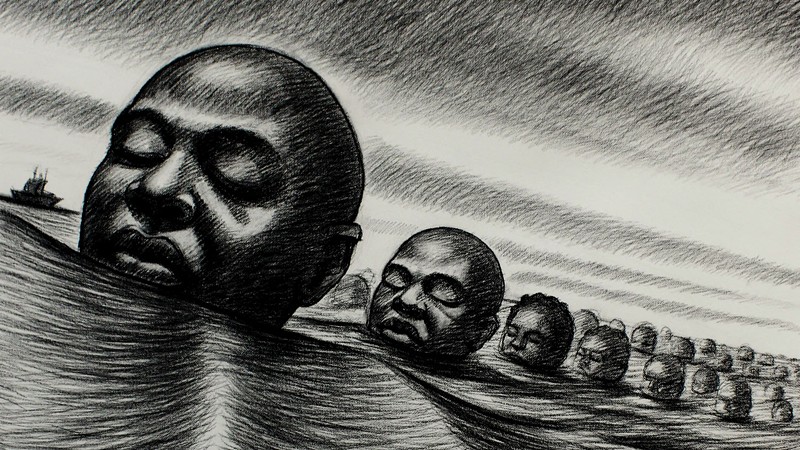At the onset of Stamped from the Beginning, the Netflix documentary based on Ibram X. Kendi’s 2016 book of the same name, a question is posed to viewers and the participating scholars: “What is wrong with Black people?” The answer, unsurprisingly, is “nothing,” one respondent concludes. But it begs another question: “What is wrong with white people?” And that answer, too, is easily gleaned from this more than 90-minute production in the capable hands of director Roger Ross Williams. Distilling the expansive and often complex history of American racism or anti-racism, a term given controversial currency by Kendi, is a challenging endeavor, and racism is a topic that has been treated again and again without resolution or consensus.
In this review, the impetus is devoted to the word “beginning,” which prompts many of the sections of the documentary, and I am sure many will take issue with the omission of several themes of inquiry. For Black Americans, the beginning is ineluctably the Transatlantic slave trade that brutally uprooted millions from their homes and villages in Africa. This is given short shrift here, leaping over the centuries of African history and cutting to the savage chase of European exploitation, though this plunder included more than the mentioned Portuguese. In fact, this would have been a good opportunity to indict several European nations for their involvement, summarizing the entire campaign with the Berlin Conference of 1884-85.
Oddly, there is no mention of Christopher Columbus, whose nefarious role in capturing Native Americans set in motion a practice that would continue for more than four hundred years and the subsequent abduction of millions of captive Africans. It was interesting to see only Black women among the commentators, a radical and needed departure from the usual dominance of male experts, as well as the focus on the poetic genius of Phillis Wheatley, but her ambiguity requires further interrogation as she at least on one occasion praised being brought to America. “’Twas mercy brought me from my pagan land. Taught my benighted soul to understand that there’s a God…” she wrote, further clarifying her Christian indoctrination.
Williams can be commended for the discussion of Thomas Jefferson and his conflicted words and deeds when it came to slavery, nothing more contradictory than his Declaration of Independence and mating with his slave Sally Hemings. This point could have been emphasized by noting Jefferson’s “Note on Virginia,” where he cites that Black people are incapable of comprehending the complexities of Euclid, even as he was chastised and corrected by Benjamin Banneker. The segment on abolitionism was well done and it was rewarding to see that Black abolitionists were given their propers. But more could have been said about Black resistance, the rebellions, and uprisings, including the courageous devotion to end slavery by John Brown and the five Black men who rode with him.
The discussion on Harriet Jacobs was extremely enlightening. I am sure that many Americans never heard of her, and in this context, it would have been additionally informative that her book was originally published under the pseudonym Linda Brent. Hey, where was Harriet Tubman in this saga of African American enslavement and the Underground Railroad? While Elizabeth Keckley is mentioned, this is more homework for viewers to learn about her industry and connection to Abraham Lincoln. Reconstruction and its aftermath were overlooked with only a cascade of photos to signify its historical importance, and on returning to our subject of “beginning,” the Ku Klux Klan’s origins were overlooked. I don’t recall if Jim Crow got even a mention.
One of the most poignant moments in the documentary explained Ida B. Wells-Barnett’s unwavering opposition to lynching. More could have been said about her crusade against bestial savagery, and even her rejection of the NAACP, an organization, like many other civil rights groups, that is not included in the narrative and only in passing in imagery. And how could you possibly ignore Billie Holiday’s “Strange Fruit” when talking about lynching? Possibly a cost factor or some other reason.
I thought the Central Park Five — now called the Exonerated Five — would have provided fresh currency to the notion of falsely accused Black men, but I think that point was well made without their inclusion. And such can be said about much of the presentation that even extended for hours would fall short of capturing the impact of racism on Black Americans, but this iteration can and should be seen as another promising “beginning.”
Subscribe to Metro Times newsletters.
Follow us: Google News | NewsBreak | Reddit | Instagram | Facebook | Twitter


